Have you ever noticed that when the leaves change colour on the trees and gently float to the ground in Autumn that there is a change in our body? What about when it rains?
We can see changes in nature, but we can feel them within us too. The 2020 Mood Disorder Guidelines discuss the significant impact of light on mood, inclusive of depression, sleep, mania and psychosis. However, when I wanted to discuss the effect of light on mood in my mood disorders presentation at Grand Rounds at the hospital a few years ago, I was advised by the medical director at the time not to. He stated that there was no point in discussing light and how it affects mood, because we can't exactly prescribe light therapy when the frequency of light is different in so many physical locations.
The seasons and the weather intensely affect me, many people in my family and to some degree, every person I know. Even though plenty of scientific literature talks about how changes in seasons and the weather affect people deeply on both a physiological and emotional level, there doesn't seem to be much talk about this in the healthcare field. So let's talk about it now.
The change in light on depression, sleep, mania, psychosis and mixed episodes
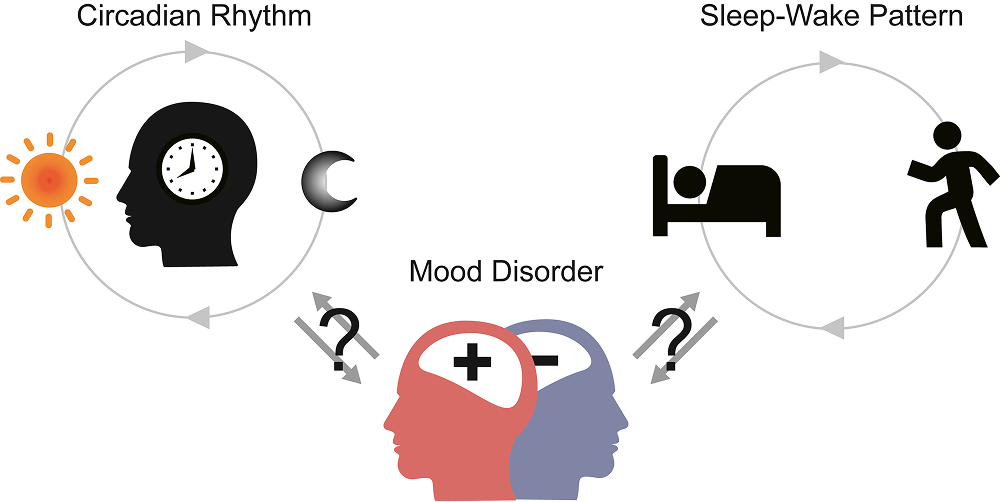
Day length and the rate of day length changes have been proposed to underlie the seasonal fluctuations of some psychiatric symptoms. In the Northern Hemisphere, for example, days are longest at the summer solstice in June and shortest at the winter solstice in December, while rates of daylength increase peak at the March/Spring equinox and rates of daylength decrease peak at the September/Autumn equinox (Nature – Seasonal Fluctuations Study).
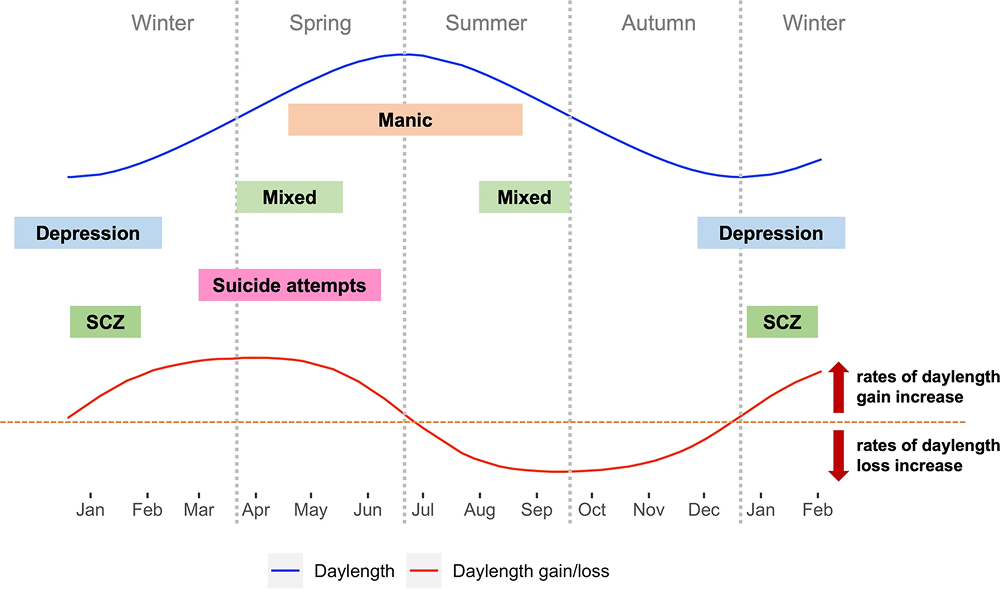
It is pivotal to also recognise that holidays (e.g., summer holidays, Christmas season and Easter) culturally, typically lead to changes in social interactions. In addition to that, the level of activity and energy levels of people based on the length of the day and temperature during such times will impact energy levels and activity. These season-related changes in social interactions could not only influence light exposure patterns but also increase the likelihood of exposure to both disruptive (e.g., drugs, stress) and protective factors (e.g., social support), thereby modulating mood and behaviour.
Australia alone (let alone any other countries in the world) has 26 different climatic zones. This, coupled with a generally changing climate, makes predicting mood changes with seasons hard to completely prepare for.
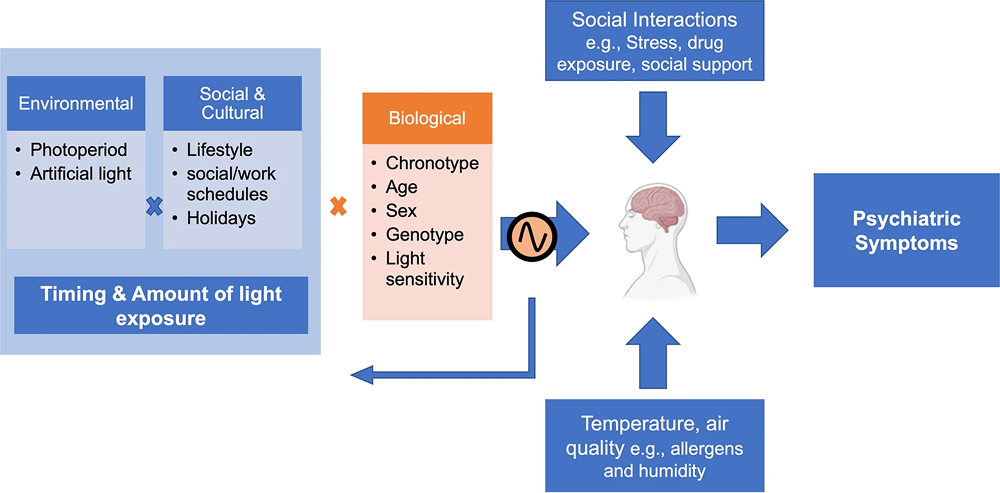
How changes in air pressure affect people physically
Human Biometeorology, as a special scientific discipline, has an increasingly prominent application in our daily lives. Unfortunately, Human Biometeorology, more commonly known as Medical Meteorology, is not part of everyday routine medical practice. Have you ever felt a headache and nausea or even joint pain while a storm is teasing and the pressure builds? People who experience these things can often know what's happening with the weather without looking outside just from what they feel in their bodies (I certainly do).
It was validating for me to know that this is not psychosomatic — it's real. Barometric pressure (which is a part of human biometeorology) is the weight of the air around us. When barometric pressure drops, such as before a storm or during cold weather, it can cause a variety of physiological changes in the body (Connection Between Pressure & Inflammation). For individuals with inflammatory conditions, these changes may be more pronounced. Some examples of conditions that can be aggravated by barometric pressure are arthritis, asthma, sinusitis, migraines and fibromyalgia.
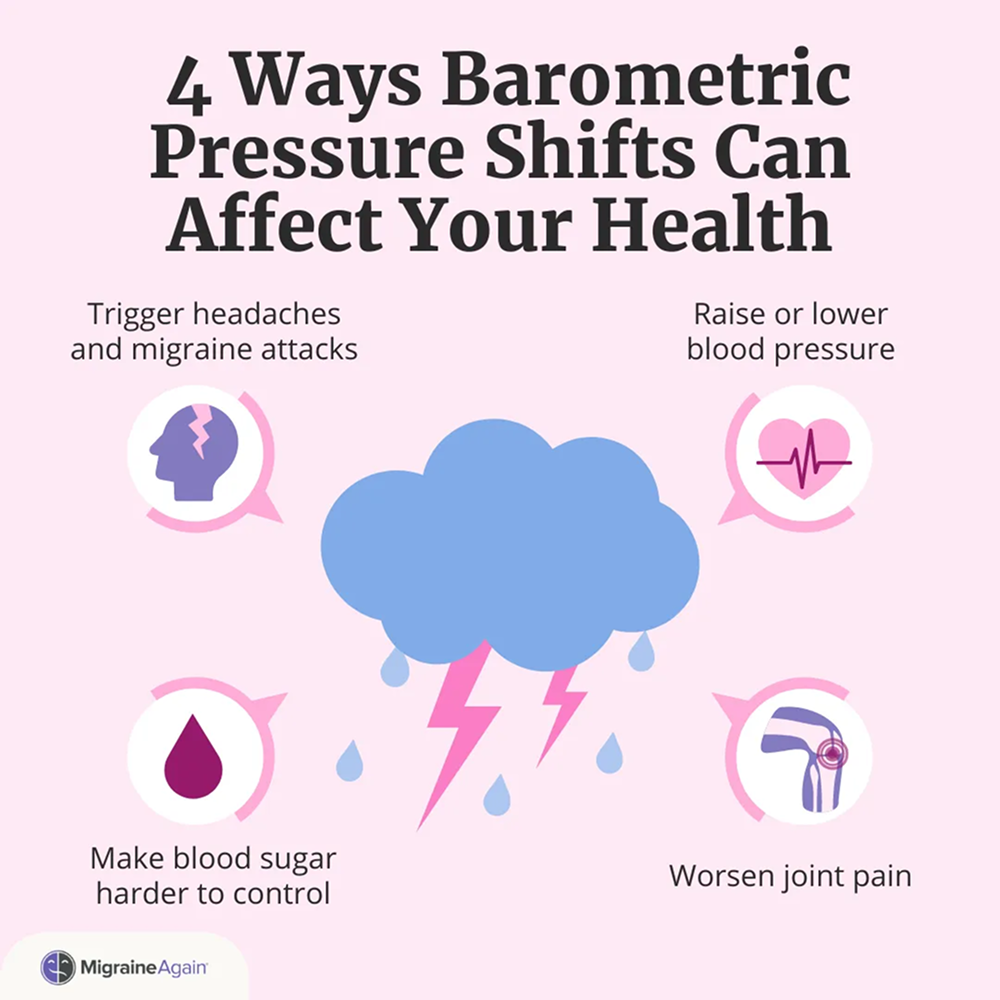
Recent research suggests that atmospheric pressure changes can affect everything from our joints to our neurotransmitter levels. Dr. Sarah Chen, a biometeorology researcher at Stanford University, explains:
"Barometric pressure fluctuations can influence serotonin production, affecting mood and energy levels. Weather-sensitive individuals often experience these changes more intensely than others."
Key factors that affect weather empaths include:
- Barometric Pressure Changes (can trigger headaches, anxiety, and mood shifts)
- Humidity Levels (impact energy levels and emotional stability)
- Light Exposure (influences circadian rhythms and emotional regulation)
- Electromagnetic Changes (may affect sensitivity during storms)
- Temperature Fluctuations (can impact stress hormones and emotional resilience).
Neurodivergent people and intensified sensory experiences
Let's first have a look at what comes under the neurodivergence umbrella to get a nice visual here:
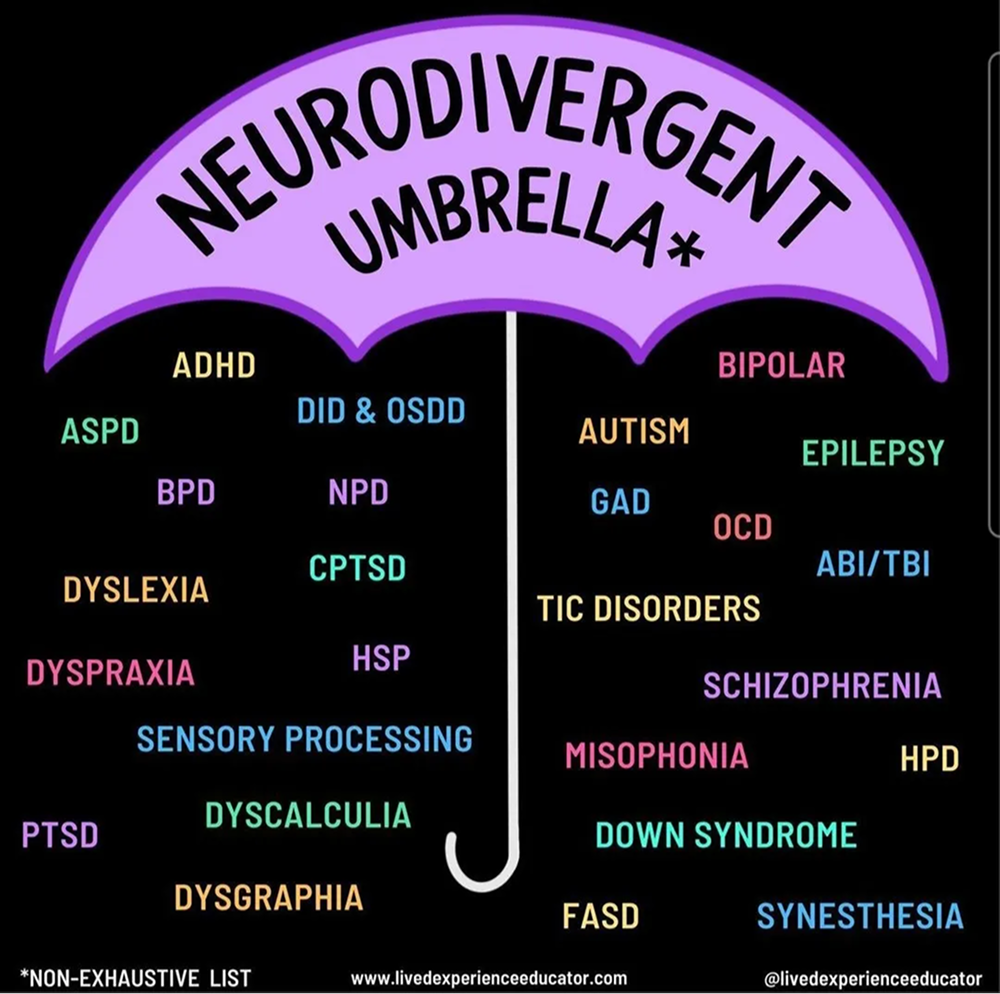
The STAR Institute provides a beautiful outline of how sensory experiences can be magnified for neurodivergent people. Neurodivergent individuals often experience unique sensory modulation, which can manifest as heightened sensitivity (where sounds, sights, and other sensations feel overwhelmingly intense) or reduced sensitivity (where the world is experienced as muted).
Some individuals may have a mixed profile, with heightened sensitivity in some sensory systems and reduced sensitivity in others, and their responses can be multifaceted and fluid. Behavioural responses to these sensory differences vary widely, with some individuals seeking out strong sensations to feel grounded and others avoiding sensation to manage overload. Sensory processing can fluctuate based on factors like stress, fatigue, or environmental changes.
So, with this in mind, neurodivergent people will likely feel changes in the weather and seasons more intensely. Again, whether you identify as a neurodivergent person or not, I think no one is immune to how the weather and seasons affect them to a particular degree.
How much of these feelings are spiritual or cultural?
I don't think it is something that anyone else can decipher for you on your behalf. After all, you know you better than anyone. Before you tap out of this article, wondering if I'm running into woo-woo territory, stay with me.
The biopsychosocial model is a healthcare approach that considers biological, psychological, and social factors when understanding and treating health conditions. Spirituality and culture are typically considered social factors.
I have both Lithuanian and Australian ancestry. The Lithuanian side of the family has a strong streak of neurodivergent people. Culturally, we also celebrate and practice pagan rituals and beliefs that are directly linked to the importance of seasonal changes. Each part of nature, with every chapter, holds symbolic significance.
I'm done with trying to work out if what I experience with the change of the seasons is mental, physical or spiritual. In a biopsychosocial model, everything is intertwined. Spirituality does not have to mean religion (yet it might for you). Spirituality does not have to mean practising yoga or believing in the energy of crystals (but again, it might for you). Culture also does not have to mean understanding another language (but it might for you).
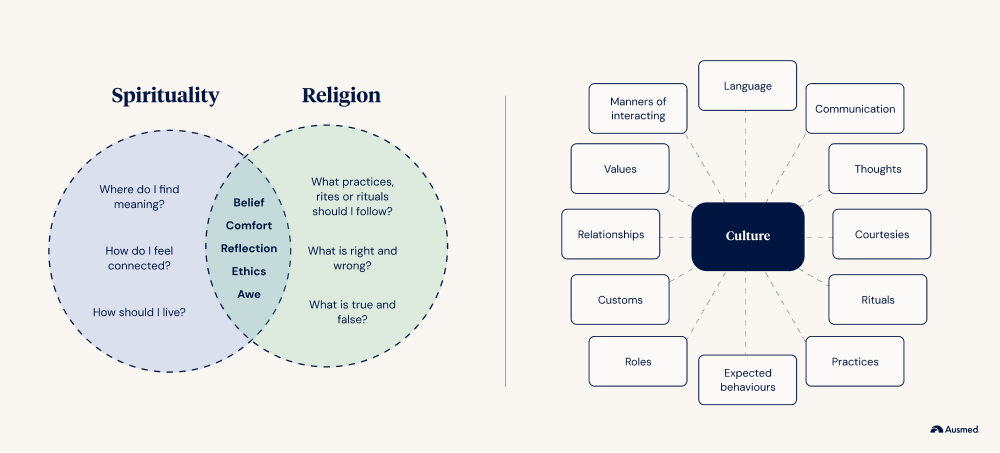
When you find a spare moment, I encourage you to take a moment to think of what spirituality and culture mean to you, generally but also with weather and season changes.
Is light really that powerful in affecting sleep, energy and mood?
Prior to 1989, natural light indicated to people when they needed to go to sleep and when to wake up — think about when you go camping and try to stay up late or sleep in while you are in a tent. Thomas Edison's brilliant invention of artificial light in 1879 changed the world.
The connection between artificial light and sleep disorders is a fairly intuitive one. Difficulties with adjusting the circadian clock can lead to a number of sleep disorders, including shift-work sleep disorder, which affects people who rotate shifts or work at night, and delayed sleep–phase syndrome, in which people tend to fall asleep very late at night and have difficulty waking up in time for work, school, or social engagements (Sleep Disorders and Circadian Clock Reference).
How do I work with the changes in the weather and how it affects me?
Social Rhythm Therapy and Circadian Health
The Mood Disorder Guidelines (2020) suggest that 'social rhythm therapy' is a remedy for mood changes affected by the seasons. Social rhythms are patterns of habitual daily behaviours that may impact the timing of the circadian system directly or indirectly through light exposure.
According to the social rhythm hypothesis of depression, depressed individuals possess a vulnerability in the circadian timing system that inhibits natural recovery after disrupting life events. Social rhythm therapy supports the implementation of regular, daily patterns of activity in order to facilitate recovery of circadian biological processes and improve mood.
The Challenge of Cultural and Workplace Expectations
One of the difficulties we face is that because mood changes due to seasonal changes are not discussed, culturally, most systems won't adjust for these changes. For example, even when the daylight is decreasing, most workplaces will not adjust their work hours. This means that employees are essentially expected to wake up in the dark and somehow feel as energetic as they would in summer when the daylight hours are longer.
Why Seasonal Changes Affect People Differently
It wouldn't be fair to make a broad generalisation of a particular antidote for all people when they are affected by weather and seasonal changes. This is because seasonal changes affect people differently. Most people can attribute some feelings of sadness or low motivation when approaching winter. This is often attributed to colder weather, but without us realising, as you can see now, this is actually about the light.
The Struggle of Seasonal Transitions
When the days are longer, people are more likely to have more energy and do a greater number of activities with ease and less sleep. That is all reversed when the days are shorter. What is not really talked about openly are the major fluctuations in mood when the seasons are transitioning. Season transitions can be really tough because your brain and your body are trying to play catch-up with what is going on outside.
Mixed Emotions and Hypomanic States
Hot days with cool evenings mean that you don't know how to dress, for example. When the days are getting shorter, we know we need to go to bed earlier, but after summer, it's hard to do that when we are used to going to bed much later. Because of this, you may present with mixed emotions, almost a 'hypomania' — a mix of depressive symptoms, nostalgia/intense reflection as well as excitability, racing thoughts, creativity and feelings of impulsivity.
Giving Yourself Grace
What I've learned is that it is important to give yourself grace when the seasons change. I used to fight, allowing myself to do fewer activities during the shorter days, but now I've learned that I need to feel nurtured and nourished.
Rituals can also be helpful. Many of us have rituals that we don't even think about that are symbolic and provide some comfort and peace with weather and season changes. Some examples may be an annual beach trip in summer and weekly fires on a Sunday in winter.
One thing is for certain, though, seeing bright morning light at all points of the year does help to regulate mood, sleep and energy.
My cousin Dana Kabaila (Counsellor and Speech Pathologist) and I wrote a short diary summary of What March Means to Me, which explores the different physiological, emotional and spiritual experiences that have come up for us with the change of the seasons. If you would like to read this and see if elements of it resonate with you, please scroll to the end of this article.
Whatever the seasons and the weather bring up for you, it helps to validate and honour how you are feeling. Change is hard, so do whatever you can to nurture yourself through these changes. Maybe the prescription for the changing of the season is simply individualised self-care, with the acknowledgment that our routines, feelings, and behaviours will change with the seasons and the weather. Mother Nature leads the way, and somehow, we must follow.
"What March Means to Me"
Rasa
The days are getting shorter and I know I need to sleep but my mind and body have not caught up. It's not even a choice — I am awake. It feels like what I imagine a hypomanic mixed episode to be — and maybe it is. Maybe it's not? Is it my ancestry? Is it because I'm neurodivergent? Is it all of these things or is it just the seasons?
I feel irritable and sad but it's hard to cry and I also feel excited — really creative. When the days become shorter and the days are still hot, I feel a bit angry — how am I meant to dress? Mother Nature — how do you want me to feel? What are you telling me? Let me catch up with you, I can't catch up, I'm confused.
It's at this point that I don't believe antidepressants help me at all — because no matter what this feeling comes up at this time of this year — and it's big. It's so big that it's only now, as the changes in light settle, that I feel I can write about it. It's like moving houses — it never gets easier no matter how many times you experience it. One thing is for certain — it shows me I am ALIVE.
It happens every year. I cannot escape it. As the sun sets, I feel a sense of urgency to make sense of things and do things — to make the day longer — but I can't. I'll trip over and get bitten by mosquitoes to try and garden in the dark to rebel against the shorter days and to make sense of the changing light. I need to see the sun set and the sun rise to try and process the transitions but even with that it's not easy.
The world feels like it's ending even though I know it isn't. And with that come dreams and thoughts of nostalgia — our grandparents coming back to say hello and then images of intimate relationships and friendships that didn't work out.
Ironically, it's my favourite time of the year — the nights are cooling, the days are sunny, the sunsets are deeper, the leaves on the trees change colour. It's all so beautiful that it feels like my heart will explode and my brain is going just as fast with it.
Easter comes — it's a relief. Things make sense. I can nap again. It's a rebirth — in a spiritual and emotional sense. And every year, usually at Easter or Mothers Day — I get sick. Although it's not fun being sick, at this time of the year - it's almost reassuring. It's like my body and the seasons have come full circle — my body can finally crash and my mind can switch off and I can truly embrace Autumn.
Dana
I feel a sense of relief. That the exuberance of Christmas and summer is slowing down. That I can make a mental scrapbook of those rosy times and gatherings. That I can re-find some kind of routine.
Sometimes the changing trees and flowers make me swell with feelings that I can't put into words — something like bitter-sweet, tender, nostalgic, grateful, moved. There is an intensity of feeling that can set me alight — inspiration, brain on fire, ideas, projects, collaborations, dreams. Waking dreams and often nightmares when sleeping. Anxiety dreams that often feel long and drudging, sometimes jarring and other times just mundane. Rasa and I talk about it together, share the big feels, thank goodness. But most people don't. People seem flustered, drive erratically, speak wistfully.
Ever since pregnancy, I get overheated more often than not and the blood has always pooled in my legs when standing and made me feel faint. I like the cool on my skin, with the still present sun, helping my heart and grounding me in the sensation of clothing layers.
The humidity starts to get high. The clothes don't dry as easily and the house is more prone to smelling. I start to welcome back comforts like slippers. I feel like my vision narrows, I start to burrow a little more.



